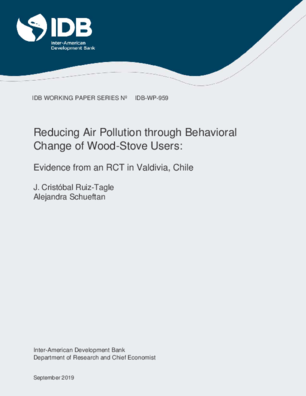Reducing Air Pollution through Behavioral Change of Wood-Stove Users: Evidence from an RCT in Valdivia, Chile
Date
Sep 2019
Ambient air pollution is a serious problem in cities in south-central Chile because of massive combustion of wood as fuel for residential heating. To reduce air pollution emissions, Chile’s environmental authority has implemented a large-scale program consisting of replacing old, highly polluting residential wood stoves with new, less polluting ones. However, to extend burning time and save on wood fuel expenditures, users tend to dramatically constrain the air flow in these new wood stoves, which creates a highly polluting combustion process. To address this issue a behavioral intervention was designed to provide users with feedback on their wood stoves’ air pollution emissions. The intervention consists of a metallic sign that aligns with the wood stoves damper lever and that informs users of the level of pollution emissions according to the chosen setting of the wood stove’s damper. To assess the effectiveness of this information sign, a randomized controlled trial (RCT) is conducted in selected households in the city of Valdivia, Chile. Results from this intervention show that the information sign induced a behavioral change in wood stove users that translates into a 17.3 percent reduction in residential pollution emissions.




